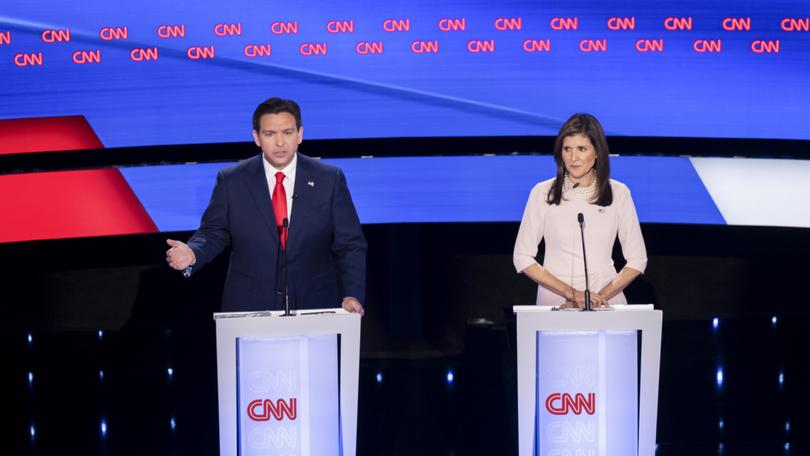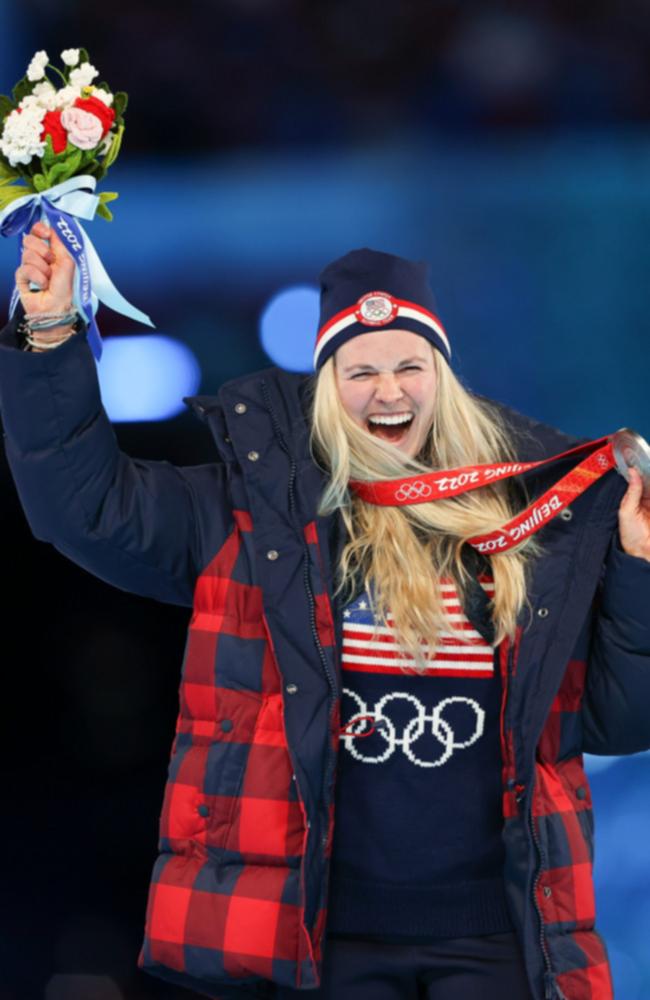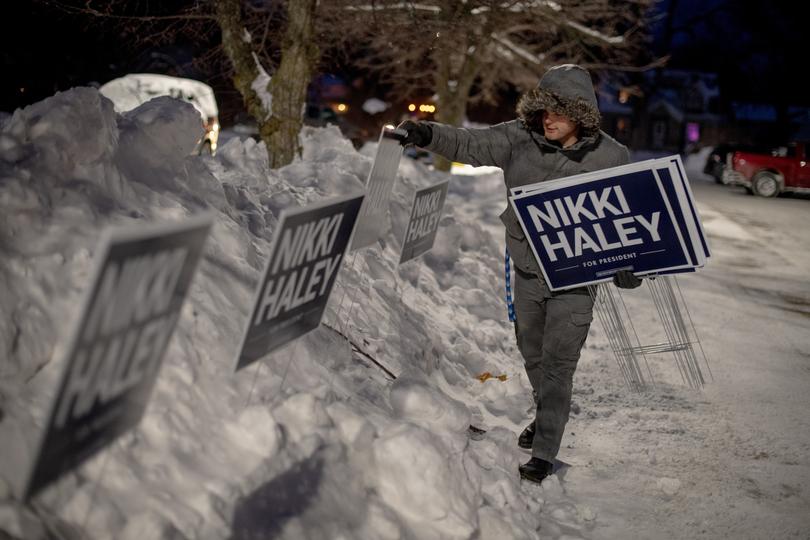The New York Times: Nikki Haley or Ron DeSantis to experience the joy of defeat in Iowa Caucuses
The runner-up, whether it’s Nikki Haley or Ron DeSantis, will claim the Republican mantle of the chief alternative to Donald Trump.

One thing is certain in Monday night’s Iowa caucuses: The loser will make a triumphant victory speech.
That’s how it works in early-state presidential politics. It’s the rare contest where coming in second is … a win? The runner-up, whether it’s Nikki Haley or Ron DeSantis, will claim the Republican mantle of the chief alternative to Donald Trump heading into New Hampshire’s primary.
The dynamic has created some hilarious and slightly mind-bending moments in the annals of presidential politics. Eight years ago, a triumphant Marco Rubio declared: “This is the moment they said would never happen.” He was in third place.
Sign up to The Nightly's newsletters.
Get the first look at the digital newspaper, curated daily stories and breaking headlines delivered to your inbox.
By continuing you agree to our Terms and Privacy Policy.There’s a long history of candidates turning second place into a rhetorical victory. In 1992, Bill Clinton placed second in New Hampshire and declared himself “the comeback kid.” Trump is the exception here. In 2016 when he placed second in Iowa, he claimed fraud and asked for the results to be thrown out.

To learn about the joys of being a runner-up, I called Jessie Diggins, a cross-country skier from Minnesota who knows all about the gap between first and second. She won the first U.S. cross-country skiing gold medal in U.S. history at the 2018 Olympics and then took a silver and a bronze in 2022 — and did it in brutal weather similar to the subzero temperatures that have descended upon Iowa.
“The difference between a gold and silver is it will change your life — or it won’t,” she told me from a ski camp in the Italian Alps, where she said she had learned to make tortellini while taking a break from the World Cup circuit.
When Diggins won gold in South Korea, NBC’s announcer nearly hyperventilated on the air. “Here comes Diggins! Here comes Diggins!” he screamed as she moved into first place just ahead of the finish line, followed by “Yes! Yes! Yes! Yes! — Gold!”
When Diggins won two more medals four years later, the hype was relatively muted.
Like the Olympics, Iowa’s caucuses aren’t only about winning and losing. It will also matter how close the candidates finish to Trump. Nike may disagree — “Second place is the first loser,” the shoe company said at the 1996 Summer Games — but in Iowa second place is often the second winner.
If Haley winds up a relatively close second, expect to hear about how it’s the greatest night in her political life. DeSantis would brand himself a modern-day comeback kid with a second-place finish.

When second is really first
Diggins knows about heroic second-place finishes.
Thirty hours before she won a silver medal at the 2022 Olympics in China, she came down with a case of food poisoning, sapping her energy. She said she was prouder of that finish while competing in suboptimal conditions than the gold from four years earlier.
Then last November, during a race near the Arctic Circle in Finland, she lost a glove and was bleeding profusely from her face and still finished second in a 20-kilometer race when it was about zero degrees Fahrenheit — a little bit warmer than the expected minus 5 in Des Moines on Monday night.
“There’s this really interesting relationship between first place and second place because there’s how everyone else treats you, and then there’s how you feel about it,” she said. “If you allow other people to evaluate you, you will never be happy because you will never make everyone happy. And I think that’s probably more true in politics than anywhere else.”
Then there’s the weather — the first topic of conversation for just about everybody here in Des Moines.
DeSantis and Haley have turned Iowa’s weather into a piece of their stump speech. “It’s not going to be pleasant,” DeSantis said of the caucus conditions.
For her Olympic races, Diggins said she was wearing “as many layers as I thought I could still move in.” The key to succeeding in brutal conditions, she said, is not letting the cold get to her head, even if every other part of her body is freezing — lessons that carry over to running a presidential campaign.
“It’s really just a pain tolerance,” she said. “How much suffering are you willing to put up with and are you willing to go there?”

The coldest caucus
How cold is it? The Diocese of Des Moines gave Catholics dispensation to skip Sunday Mass. The National Weather Service described conditions as “arctic.”
It will be warmer Monday night than it has been over the weekend, but that’s not saying much. Des Moines could see temperatures of 10 below zero, with windchill as low as 30 below, according to the National Weather Service.
Nevertheless, Republican presidential campaigns are asking Iowans to schlep to more than 1,600 caucus sites across the state Monday night to cast ballots in the first presidential contest of 2024.
“We’re going to be out there in the snow,” Nikki Haley said Sunday, my colleague Jazmine Ulloa reported.
I can say from some experience that being outside when it is 5 below zero is no fun, and 15 below is even worse. At those temperatures, car tires deflate. Gas stations are no help: The air and gas pumps freeze, too. It is a risk to be outside.
What that means for caucus turnout is anyone’s guess.
As my colleague Jonathan Swan reported, the Trump and DeSantis campaigns had been preparing for a record turnout of more than 200,000 caucusgoers, eclipsing the previous high of 187,000 in 2016. But now it’s anyone’s guess.
David Kochel, a veteran Iowa Republican strategist, predicted about 150,000 Iowans would show up Monday, a figure in line with historical norms, but still just about 25% of the registered Republicans in the state. He cited Trump’s lead and the weather as the biggest factors.
In cities and suburbs where Haley’s supporters are more prevalent, the roads are plowed and there’s less blowing snow. Trump’s supporters in rural Iowa are said to be more motivated, but blowing snow is still whipping across the network of two-lane highways. The DeSantis campaign says his supporters are the most committed caucusgoers of all.
All the Iowans we’ve talked to have told reporters they can handle the brutal weather. We’ll all find out Monday night, given their shoddy track record, if they can finally carry out glitch-free caucuses.
This article originally appeared in The New York Times.
© 2023 The New York Times Company
Originally published on The New York Times
